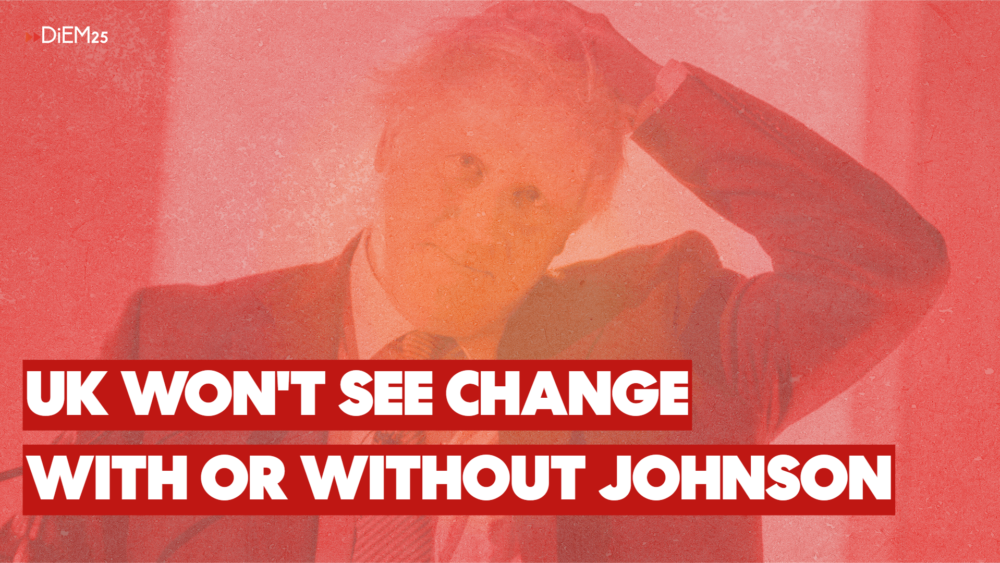Whether Johnson staggers pointlessly on for another year or a few months or a few weeks, the prospect of any hypothetical replacement grasping the urgencies looks dim at best
One might be tempted to say that last Monday’s vote of confidence in Boris Johnson left the UK prime minister clinging to his role for dear life, had this sentiment not been bandied about so often in the past year or so that it has lost any real meaning.
The prime minister won by a margin of 211 to 148 MPs. While it is true that this is the most damning verdict ever delivered on a sitting prime minister by their own party, that Johnson has lost his majority support in parliament, and that this may eventually prove to be the beginning of the end for this particularly craven example of a self-serving and dishonest politician, it is difficult to draw any conclusion from the landscape of post-Partygate Britain that amounts to anything but a metaphorical shrug.
A myopic torpor hovers over the UK’s political hierarchy. At the top, Johnson’s cabinet ministers know full well that they owe their positions not to merit but to servile loyalty and will not break rank for love nor money – at least not just now. Meanwhile, Conservative MPs offer differing diagnoses and cures for the continued unravelling of the country which they have been governing for 12 years.
These include a reshuffle, a ‘more Conservative’ approach (cutting taxes), a scaling back of the culture war and a desperate attempt to show a beleaguered public, beset on multiple fronts by the cost of being alive in 21st century Britain, that they ‘get it.’ But it is not just Johnson’s cabinet and advisors – handpicked according to obedience, culture war prowess and lib-triggering points, in roughly that order – which is utterly bankrupt of relevant ideas. The wider Tory party can offer little more as salves for the ongoing wreckage of Thatcherism than yet more zombified and rebranded Thatcherism. This week, as a response to the housing crisis, is a re-dredging of George Osborne’s dead-on-arrival policy of some five years ago, which itself was a zombification of Thatcher’s housing policies in the 1980s.
Those who continue to call for Johnson’s resignation will hold out for another vote, or else pin their hopes on the findings of Parliament’s privileges committee, which will investigate whether the prime minister misled the House of Commons. If found to be the case, as they predict, Johnson may be brought down either by resignation or by a fresh confidence vote. Meanwhile, the leadership questions rumble on.
So, too, does the national unravelling. The UK’s cost-of-living crisis is crunching virtually every aspect of everyday life and expenses, and aggravated by the war in Ukraine, it will only get worse. Child poverty rates are projected to increase to 5.2 million this year. The educational and developmental (to say nothing of the economic) deficits of more than one generation crippled by COVID-19 show no sign of being addressed. Swathes of UK transport infrastructure are beset by widespread dysfunctionality, soon to be added to by a wave of strikes brought on by yet more Conservative attempts to move more and more jobs in the public sector towards the gig economy model. Harried along by Tory privatisation bills, the NHS continues to bleed money, infrastructure, and staff. And, hovering above it all, a collapsing ecology and biodiversity, helped along by years of government-sanctioned poisoning of rivers, soils, and human bodies, alongside the destabilisation of the global climate.
As a society we have never been so acutely informed of the extent to which we are sabotaging the foundations of a decent and liveable future – not a distant future, but one very close at hand. If it sounds melodramatic to regard the crumbling infrastructures and institutions of the US or the UK and term those countries ‘failed states’, surely it is fair to designate them ‘failing’.
The root of this failure, in the UK as in the US, is political. Whether Johnson staggers pointlessly on for another year or few months or few weeks, the prospect of any hypothetical replacement, to either nominal right or nominal left, grasping the urgencies of the moment looks dim at best.
The only approach that is commensurate with the tasks we face involves embracing their inherent possibilities. Neither the zombie Tory party nor the moral and ideological vacancy of the current Labour party show themselves capable of anything but stumbling or dazed, from crisis to crisis.
But another vision is possible, and is already in motion. It is led by an understanding of the public common good. This means proper support for the NHS. It means a meaningful Green New Deal to address the many-pronged ecological crisis. It means, in short, leadership appropriate to our times, leadership led by new coalitions of people working together, where our old institutions have failed us.
To find out how you can get involved in DiEM25’s campaigns, from saving the NHS to a meaningful Green New Deal, click on the aforementioned links, as well as our new manifesto which explains how we aim to get Europe as a whole on the right track.
Do you want to be informed of DiEM25's actions? Sign up here















